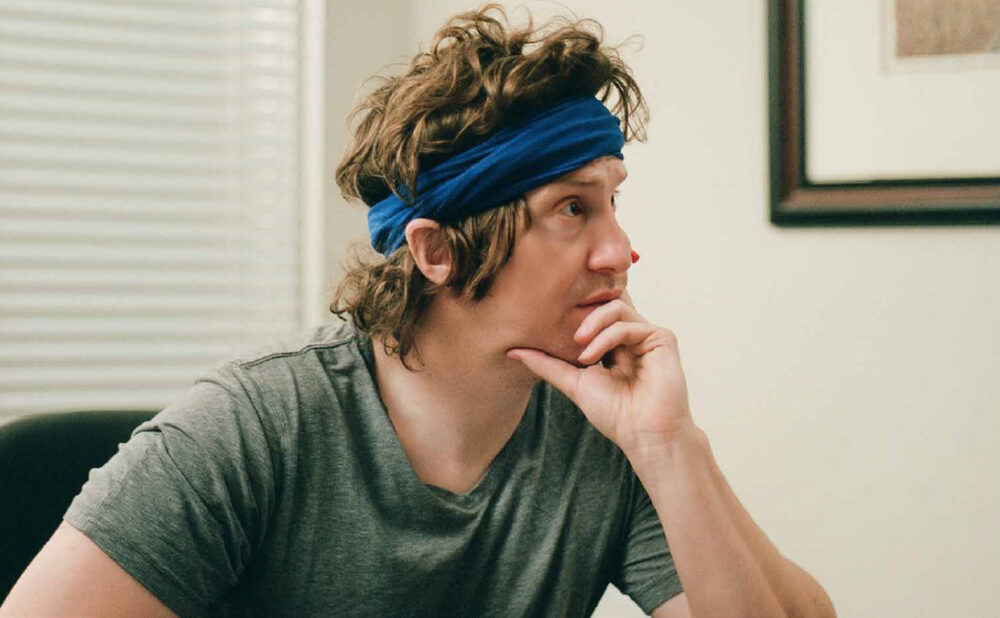New ‘BlackBerry’ film tells startup story, not just tales of tech company intrigue
Startup dreams and compromises at core of universal story, film’s director acknowledges
Blackberry: Director Interview
Where: In theatres
What: Movie, 119 mins.
When: Now
Genre: Drama
Rating: NNNNN (out of 5)
I APPROACHED VIEWING the new film BlackBerry expecting to be entertained by a semi-factual telling of a business story that has always intrigued me. What I got was a film that felt deeply personal as it told a tale that resonated with me in ways I never expected. Equally surprising was writer/director/actor Matt Johnson’s reaction when I told him of my experience of his film during a recent Zoom interview.
When Johnson appears on my screen for our interview, his smile and energy are impossible to resist, and I immediately feel comfortable sharing my personal response to his movie.
“I really had a connection with the film that I didn’t anticipate because I started my own business as a young person without knowing anything about business, too,” I explain to Johnson. “And I had that whole thing of thinking we needed a business shark, the way those guys did.”
“What was the business?” Johnson asks.
“NOW Magazine,” I reply.
“Come on. I’m a huge fan of NOW,” says Johnson stumbling over a few more words; he then leaps up and disappears from the room and the screen, returning holding a giant picture frame containing a blow-up of a NOW cover from the mid 2000s with him on the front page.
It was for a show he made on Vice TV called Nirvana the Band the Show, and I recall the editorial meeting where we decided to put him on the cover. We thought it was cool to cover something airing on Vice.
“Our whole dream, when we were kids, was we were trying to get our show on the cover of NOW magazine. Oh, my God. And then when I remade the show as an adult for Vice, they finally put us on the cover and it was like a dream come true for me.”
Successfully creating the magazine was a dream come true for me, and Johnson’s film so effectively captures those clumsy moments as amateur businesspeople struggle to bring shape to their dreams, or friends who have come together to create a passion project try to process what they’ll have to do next to be a “real” business. I used to say, “We didn’t make a newspaper to have a business, we made a business to have a newspaper.”
But I also wanted to stay in business.
I was convinced there must be some secret, linear way to build a business known only to successful MBA grads. There must be some time-tested rules to success, and I just needed to find someone who knew them and who would share The Knowledge.
Fortunately, I would eventually learn this was bullshit, but it didn’t stop me, in the early days, from routinely searching for “sharks” who might somehow know and share their secrets for success, almost making some very bad moves along the way.
Kind of like the BlackBerry co-founders.
“It’s something that I, myself needed to learn as well,” says Johnson, “being a young filmmaker and not exactly beginning in the business with that type of persona. I had a much more nice-guy persona when I started as a kid. I also really learned the hard way that the only — maybe not the only, but I wound up adopting much more of Jim’s, uh, (I guess it’s a persona with him as well), but his, kind of, kill or be killed attitude, myself. I basically just integrated it into my own personality and that was very useful to me. And so I thought I’d make a film honouring that in a way.
“In some ways, I identify most with Jim in the movie, even though I think that that’s maybe a dangerous thing to say. Or maybe people think that that’s crazy. But I actually see the wisdom in what he was doing from a strict, means-to-an-end point of view. Because, as I’m sure you’ve experienced, sometimes in order to create the art that you want — or, in your case, to create the platform that you wanted to create — you do need to do things that you wouldn’t do in your day-to-day life. I’ll just say it like that.”
I remember vividly trying to adopt the persona of a hard-nosed business guy as I got ready for what I anticipated as a challenging business meeting.
“What you said resonated with me too,” I tell Johnson, “because what you said about playing a role, I sort of felt like I became a character. It’s like, ‘I’ve got to be like that guy in film,’ I would literally tell myself, ‘I’m going to be like a guy in a movie playing a hard-nosed businessperson’.”
“Dude, it’s exactly the feeling. It’s like you put on a mask. That’s why there’s so many masks in the film and why I was so conscious of having Jim’s office be covered in masks. Because I believe, in a Jungian sense, you don a kind of shadow version of yourself in order to go out and do these things that that the child inside you would wither at. And I thought, ‘Oh, this is interesting because I feel this way’.”
“And that’s what pulled you into the story?” I ask. The film is based on Jacquie McNish and Sean Silcoff’s book, Losing the Signal: The Untold Story Behind the Extraordinary Rise and Spectacular Fall of BlackBerry.
“Yeah, a hundred per cent. I would say that more than anything,” says Johnson.
“But I am like you because the whole reason I made this movie —I don’t know anything about tech or I didn’t even, I don’t even have any real interest in it, to be honest — but in reading the book, I saw, like you, myself. I saw a young filmmaker, who was struggling to make the right choices and the moral choices and make the world better in the way that Mike wanted to, but also needing to behave like Jim in order to keep the lights on in our production company. And so I thought, well that’s an interesting tension that I personally have lived through. And so, I could tell this story through that lens.
“Wow. So, I’m happy I spoke to you in that way because that’s what it’s about. We were trying to make a movie about startup arts culture.”
I can’t help noting that isn’t it quintessentially Canadian to tell a story about a company that ultimately failed? There’re a lot of wins in this story, but ultimately, the big American beats them.
“Yes, in a major way. Yeah. And you’re wondering why. Well, you know what, I think that fundamentally my career is kind of dictated by one big myth, which is the Gilgamesh myth, which is about failure, about the king who goes out looking for eternal life and then doesn’t find it, and then comes home thinking that he’s failed only to feel rejuvenated as he returns to his kingdom
“And I think I, my own life is closer to that and maybe more connected with that story than it is with Jason and the Argonauts, one of those other myths where the hero really, really wins. Because I think there’s valour in, in losing, and I think the film tries to show that these guys exhibited that. Uh, and it’s maybe in some subtle ways, but certainly Jim and Doug, I think, were able to (even though they lost) turn this into a win by not compromising the principles really at all.”
“I guess what you’re saying is there are different ways of keeping score,” I say.
“Exactly, that’s a beautiful way of saying it,” says Johnson.
And BlackBerry is a beauty of a film, not just limited to one tale of business intrigue. Johnson and his team have created a film that tells a bigger, more universal story, of dreams and dreamers and the nightmares they stare down along the way and their struggle to be true to those initial aspirations.
FUN FACT — NOW was the first magazine on BlackBerry soon after it launched in 2002 and provided the only content for a while: a “news ticker” of its events listings, for which BlackBerry paid. They gave me a free BlackBerry and I took it with me on a lunchtime walk shortly after receiving it, then quickly decided I didn’t like the idea of my email following me around during my “contemplation time” and put it back in the box, unused, only to become a smartphone person when the iPhone arrived.






